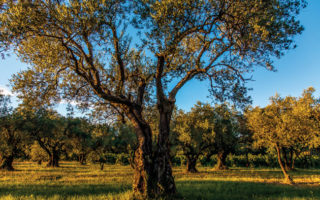Beekeeping in the Charente – Walking Bees

Last month I wrote about inspecting hives and swarm management techniques, so hopefully, a few weeks later, you know how your colonies are doing, and that you still have them living in your hives!
April was an interesting month for us as it seems we had all the seasons at once – the poor bees didn’t know if they were coming or going. We diligently carried out our checks and found two more colonies without queens so we moved frames of eggs and larvae from other colonies in the hope that the queenless colonies would take the heavy-handed hints we were dropping and raise a new queen. They did take the hints and raised more than one queen so we found ourselves up ladders collecting our own swarms from brambles and trees. Luckily we managed to convince them that our hives are desirable homes and they stayed where they were put. We think that this small success is down to the fact that we ‘walked’ the bees into the hives rather than shaking them in. It’s almost as if they are happy to stay somewhere that they feel they’ve chosen rather than living in a home that has been forced upon them.
Walking bees into a hive sounds bizarre but is exactly as it sounds. Having moved the swarm cluster into a suitable container (a cardboard box in our case), we then carefully placed it on a cloth spread out in front of an empty hive. Under the cloth was a makeshift ramp leading up to the hive. Bees will move upwards into a dark space – within minutes the swarm cluster left the box and marched up the ramp into the hive. We tried to spot the queen but didn’t see her, although we knew she must be there simply because of all the bees fanning and following her pheromone trail. Within half an hour the box was empty, and the bees were in their new home.
May is the month in which colonies increase rapidly in size; the queen will be laying thousands of eggs a day, and the workers will be building comb and foraging for pollen and nectar. You may notice that the supers that you put on your hives in April are starting to fill up, especially if you live in an area where there are fields of oil seed rape. If the weather is good then the bees will find plenty of food, but if we have more rain and the temperatures nosedive then they won’t be able to venture outside. This is when they need a boost in the form of spring feeding, a weak sugar syrup to ensure they don’t starve. I have been feeding the new colonies we collected as swarms simply because they have no stores of food and if they can’t go outside then they need food!
It’s important to keep checking for swarm signs in the hives too, and also to carry out varroa mite counts. These pests are aptly named ‘varroa destructor’ as they can easily wipe out a colony if allowed to thrive unchecked. There are several treatments on the market and these can be used before the main honey flow takes place. If the daily mite drop count is above 6 in May and 10 in June then treatment is necessary; without it then the colony could collapse by the end of the season. Carrying out a count isn’t difficult provided your hive has an aerated floor; just place a white board under the hive, leave it in place for 24 hours and then remove it. The board will be covered in hive debris, bits of pollen, drops of nectar, bee body parts, and dead varroa mites. If you see more than six mites from one day of collecting this month then you need to treat your hive, it’s as simple as that!
As ever, if you need any help with any aspect of beekeeping, please contact us at 13bees and we’ll be happy to answer any questions or assist you where we can.
Amanda and Kevin moved to Confolens (16) in 2015, opening a chambre d’hôte and launching their beekeeping experience holiday business. They live with five cats, two tortoises and several thousand bees, and enjoy sharing their adventures in the apiary with others.
Share to: Facebook Twitter LinkedIn Email
Leave a reply
Your email address will not be published. Required fields are marked *



